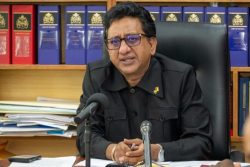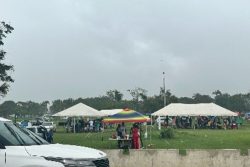 A meeting was planned to accommodate consultations on the proposed Value-Added Tax (VAT) on private education. I thought, perhaps finally, the government would acknowledge what a misstep VAT on private education is. But the little voice in my head was saying to me, “Girl, don’t tek setup. It is not going to be repealed.”
A meeting was planned to accommodate consultations on the proposed Value-Added Tax (VAT) on private education. I thought, perhaps finally, the government would acknowledge what a misstep VAT on private education is. But the little voice in my head was saying to me, “Girl, don’t tek setup. It is not going to be repealed.”
I ignored it. It was time to have some faith restored. It was time to soothe the sting on the people who would have to bear the burden of VAT on private education; it was time to set in motion a glimmer of hope for those disregarded. Surely the premature announcement back in March about the president’s intention to announce that the decision had been rescinded would finally come to pass. Surely this government would not go down in history as being responsible for a diversion in the path of those who could no longer afford to pay for an education because of VAT; a diversion that would see some giving up on their dreams or putting them on hold.
With a petition that attracted over fifteen thousand signatures, protests at the Ministry of Finance and the Ministry of the Presidency and, of course, the cries from the people who would be affected, surely, they would not continue to operate like “stick bruk in dey ears.”
I went to the meeting as a parent of two children attending a private school. The initial decision to send them to a private school was not about snubbing the public school system, but a matter of convenience. Like many other children, they were first enrolled in playgroup, which the public-school system does not provide. But then the advantages of what the school provided were an encouragement to keep them in the school beyond the playgroup. It was the small sizes of the classes, the individual attention, the warm environment and the teachers who seemed contented and dedicated to doing their best to reach each child. I’m not saying that these comforts are not provided in public schools but just speaking about my experience.
Being a product of the public school system, I did not have many issues with the nursery and primary schools. But that was the late eighties into the nineties.
Secondary school, on the other hand, had many issues. The transition of moving from school in the country to Georgetown, bullying and having to cope with the lack of resources at the school were some of my challenges. I used to regret having paid to write History at CSEC and then having to abandon the idea because there was no teacher to administer the School Based Assessments (SBAs). Also, I was frustrated as a creative person as there was little to nurture my creativity.
However, many who attended public schools have highlighted how wonderful the schooling was that set the foundation for who they are today. Indeed, Guyana has and continues to produce many scholars from the public schools. But whether public or private, there are also many people who leave school who would be considered failures—those with no significant passes at CSEC and with no prospects for going on to university or establishments like the Government Technical Institute.
While in schools there are extracurricular activities, the focus primarily is preparing students to write examinations. For years, I have been saying that the school system should be providing a holistic learning experience. A school should be a place to nurture children in whatever they excel at—because we are born with different gifts—and not just a place to provide them with information.
But maybe I am asking for too much now. Maybe as we continue to evolve, the system will change. In the meantime, those who excel at examinations will continue to be esteemed as the best and brightest, while those who find it challenging will continue to be seen in the eyes of many as failures. In both groups, some will go on to become successful, while others will not.
At the meeting on the VAT on private education, the collective cry was “Wrong decision. Withdraw it.” Emotional testimonies were shared; pleas were made for the government to revoke the measure; and figures were presented saying how little it would help the economy. It was highlighted that the petition was ignored. There were also recommendations to call out the schools that have not been tax compliant. (Before it was revealed that many private schools are not tax compliant, I doubt that any parent would ask whether the school was paying taxes or not before they enrolled their child.)
I observed the ministers on stage and I could sense the tension. I especially focused on the Minister of Education, who seemed stressed, and I thought, what a challenge it must be to sit in government: Having to face criticisms daily and, in the case of Guyana presently, with hardly any focus on the successes. It must be hell. How do these ministers rest at night with the burden of the country on their shoulders? Do they have times when they pace and hold their heads? What coping mechanisms are in place to help them maintain their mental health? Are they as worried as the people? Do they feel disappointed? These are all questions that swirled around in my head as I observed what was happening.
Some people would bluntly say that many ministers probably do sleep well at night. That while the average man worries about where they will find the next dollar for some new tax tomorrow, politicians both in government and opposition are playing games.
“Dey bread well-buttered,” many would say.
But is it when you are losing favour with the people?
I would never want to be accountable to a nation. I admire those who take the step.
It is unfortunate that after the meeting it was announced that there would be no immediate withdrawal of the VAT on private education, but that it will be reviewed for next year’s budget. I thought that after the pleas from the owners of schools, the teachers, the parents and the students that there would be some other decision. Unfortunately, I felt like the little voice in my head was right. I felt like I wasted my time attending the meeting.
Whether a child attends a private or public school, a lot would still depend on that child’s ability to cope with the school system. A child who is guaranteed individual attention has an advantage over a child who is just one among forty in a classroom. Parents also have an imperative role to play in their children’s education and should not leave it all up to the school.
Most parents want to give their children the best they can afford. We cannot pretend that there are no deficiencies in the public school system. We cannot say too that private schools do not have issues, but the parents and students who attend these institutions cannot be made to pay for a situation they did not create.









